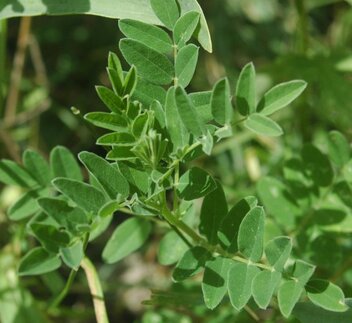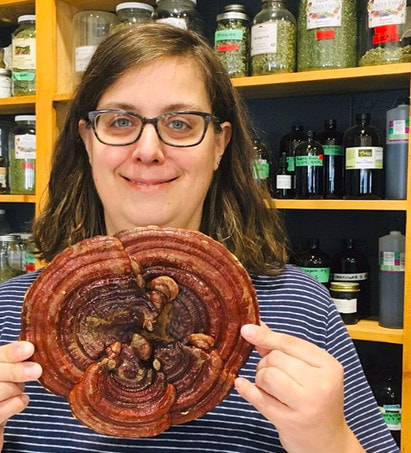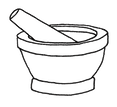 This time of year during the seasonal transition is a good time to think about our health in general, and this year especially to think about immune health. Our bodies become challenged during the change from one season to the next: where once it was easy to stay warm, for many it now requires an adjustment. Where once we were swimming in the warm humidity of summertime air, our bodies now grow accustomed to a cold, drying wind. We make all sorts of changes - our clothing, our outdoor habits. How can else can we ready our bodies for this time of year? Please make sure to check out Sue's blog about "late summer" for some general tips regarding food and herbs. It's important that herbs not become a substitute for a healthy diet and lifestyle - they simply can't make up for a lack of those things. In this article I'll be focusing in more detail on two of our most esteemed immune supportive herbs for when you're already doing all you can to stay healthy but are looking for a little extra support. These herbs can be especially helpful for those with compromised immune systems (though care needs to be taken). Astragalus Scientific name: Astragalus membranaceus (Fabaceae) This pea family plant is one of our most important "immune tonic" herbs. The root of this plant is used, either as a powder, tincture or decoction. It's native to China, where the root is cooked in soups for immune health. It's "food-like" nature makes it a generally well-tolerated and safe herb, one that must be taken in sufficiently large quantities to have the desired effect. (It's still important to do your research and talk to your doctor before taking herbs - this particular herb has an effect on immune cells, a possible issue for people with some medications or conditions.) The way this plant works is to gently stimulate the immune system, elevating white blood cells and other immune cells. In Traditional Chinese Medicine, it is said to be supportive for people with deficient "Wei Qi" or the "protective Qi" that we associate with immunity in the West. In our clinical practice we often recommend this plant to people with compromised immune systems, such as those undergoing treatment for cancer. For anyone, it's gentle support helps keep the immune system strong. It's best to avoid if you are actively sick. How to take:
 Jessica with a beautiful reishi mushroom! Jessica with a beautiful reishi mushroom! Reishi mushroom Scientific name: Ganoderma lucidum (from China), Ganoderma tsugae (local species) Seek medical advice before use of this mushroom - people with mold allergies may have adverse reactions, it may dry out the mucous membranes in sensitive individuals, it may impact the liver, and may interact with certain medications or medical conditions. Reishi mushroom is another one of our most important "immune tonic" herbs (we call it an herb though it is indeed a mushroom!). The fruiting body of this mushroom is tough and woody, so slices of it are used to make soups and teas, or it is extracted, dried and powdered. Sometimes known as the "mushroom of immortality" it is another one with extensive use in China, and the local tsugae species that grows here in Vermont is used in the same way. Similar to astragalus, for immune supportive purposes reishi mushroom is taken daily to gently modulate and stimulate immune function. The polysaccharides in the mushroom pass through our GI lining appearing potentially like something our immune system needs to deal with, keeping the immune system on a higher level of alert. Because of it's modulating effect, it may also help with an over-active immune system, making it an herb that many people take throughout the allergy season. It has a number of other ways it may support the body, including supporting the heart, lungs and liver. For now we'll just leave it as another one can help keep us healthy during this time of year, especially those who may have deficient immune function. Avoid if actively sick. How to take:
Conclusion We're very grateful to have this wonderful plant and mushroom in our lives, to support us and our community when a little extra immune boost is needed, and we humbly give our gratitude to the wonders of natural medicine. We again encourage readers to consider all the ways to keep your body, mind and spirit strong and healthy through appropriate diet and lifestyle practices (see Sue's article for some tips), and to not over-rely on these special and wonderful herbs. They are there when we need them, and we hope to maintain this special relationship with the healing powers of the natural world for generations to come. By Nick Cavanaugh. Nick is a clinical herbalist at the Burlington Herb Clinic. You can book an appointment with Nick for an herbal consultation here.
10 Comments
6/30/2021 09:38:28 am
I'd like to thank you for your information on both the astragulus and the reishi mushrooms. I've been taking astragulus and am waiting for more to be delivered. It's helping me quite a bit.
Reply
Nick
9/28/2021 06:02:03 am
Glad to hear you're enjoying it! Be well!
Reply
Nick
9/28/2021 06:02:57 am
You are right! We agree!
Reply
3/7/2022 01:00:44 am
Thank You for Sharing this informative article! I really like to visit your Product review. It is very useful to everyone Stay healthy and keep safe!
Reply
Nick
3/7/2022 07:40:27 am
Thank you, hope that you stay healthy and safe as well!
Reply
NIck
10/10/2023 08:03:30 am
Thanks for sharing! :)
Reply
Nick
6/20/2024 10:26:49 am
Thank you! :)
Reply
Leave a Reply. |
Details
RAILYARDCheck in here to keep updated on news and activities at the apothecary. Archives
April 2024
Categories
All
|
railyard apothecary
*These statements have not been evaluated by the Food and Drug Administration. This product is not intended to diagnose, treat, cure, or prevent any disease. For educational purposes only.
|
|


 RSS Feed
RSS Feed
